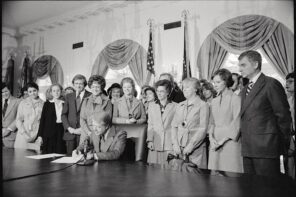Popular coverage of the fallout from the Hobby Lobby decision has largely fallen off, but the impact of the decision continues to reverberate in subsequent lawsuits and court decisions, as reported on RD by Patti Miller and others. But why isn’t the decision reverberating through the pulpit, testing theological interpretations among the faith communities that such warriors of religious liberty ostensibly claim to protect? Under Hobby Lobby, religious beliefs will guide your healthcare decisions. Those beliefs just may not be your own.
The Hobby Lobby decision has now made it possible for corporations and individuals to enter doctors’ offices, imposing their own religiously-based standards of healthcare, ethics, and access on others. This too is an issue of religious liberty for the thousands of persons potentially affected by the decision.
Those now denied access to legally-mandated contraceptive coverage hold equal protection under the Constitution and are afforded the same rights of religious liberty, which rightly extends to the ability to determine if and how religious belief (or lack thereof) will play a role in personal healthcare decisions. All persons are entitled to the ethical autonomy to elect from the full range of legal and recommended medical services afforded under the law.
For the numerous religious leaders committed to the free exercise of religion in a pluralistic society, the ongoing consequences of the Hobby Lobby decision should be encountered as deeply distressing. And yet, the heavy burden of unpacking the implications of Hobby Lobby (and subsequent cases) has generally fallen to think tanks and nonprofit advocacy groups whose whitepapers and public statements are frequently no match for the juggernaut of popular media talking points.
The U.S. is home to a multitude of religious believers who seek, in good conscience, to honor both the tenets of their own religion and the practices of others. However, confusion about the nature of religious liberty seems poised to allow a quiet slide towards a tyranny of the minority over the bodies, legal rights, and consciences of well-intentioned religious faithful.
And most distressing is that it will be women’s bodies, once again, under the thumb of warped legal, theological, and ethical understandings of proper religious practice. People of faith will be especially shaped by the public narratives about “religious liberty” now inextricably linked to women’s reproductive healthcare and the practice of family planning by both women and men.
As an ordained United Methodist minister and theological educator, I speak with greatest familiarity from a place of Protestant religious leadership. However, I am of the firm conviction that most mainline religious leaders in the U.S. share commitments to pluralism, reason, and the free choice to exercise or refrain from exercising religious belief in this country. We must find ways to reach our congregations, which are comprised of the voters, influencers and politically disenfranchised alike.
Religious leaders need to help their congregations tell the story of American religious freedom, both its successes and its failures.
Celebrate the ways religious liberty provides the crucial bulwark that allows for pluralism of belief and experience: offer special worship services, sermons, education programs, and social media outreach efforts that critically engage the tensions between freedom and liberty in religious practice and American citizenship; take a stand in the pulpit for the legal and moral place of competing religious convictions; explicitly honor the lives of women and children by calling for the provision of adequate healthcare and family planning services unhindered by an employer’s religious convictions; affirm the right of individuals to exercise their own consciences as they consult with doctors on the healthcare options they are entitled to under the law; strongly criticize interpretations of legal protection that assert the personhood and conscience of a corporation over that of the individual.
The Roberts court may think differently, but last time I checked, the Bible, Torah, and Qur’an all offer some pretty good material to get us started.




